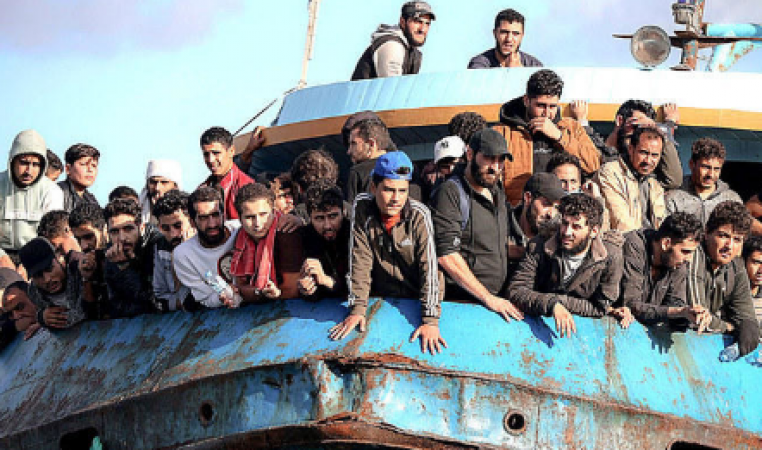
Brusells: The president of the European Commission was questioned last week as rescue efforts in the Mediterranean Sea slowed and more bodies than survivors from the more than 500 people still unaccounted for after an overloaded fishing trawler capsized.
At the executive branch of the European Union's headquarters in Brussels, Ursula von der Leyen told reporters, "It is horrible what happened, and the more urgent is that we act."
She argued that the top priorities should be to support Tunisian authorities in stabilising their economy and better managing migration, as well as to complete the long-awaited reform of the EU's asylum rules, which is unlikely to be completed before next year.
Also Read: 150 people have been arrested in France overnight after a teenager was killed by police
Ignore the fact that the trawler departed from Libya, the admittedly remote possibility that survivors might be discovered, or the possibility that this catastrophe may rank among the worst ever to occur in the Mediterranean. The response from von der Leyen was in sharp contrast to what had been done a decade earlier.
After about 300 people perished on the tiny Italian island of Lampedusa in October 2013, then-European Commission President José Manuel Barroso vowed that such tragedies "should never happen again" while standing close to the coffins of numerous drowned migrants.
Also Read: US 2024 candidate DeSantis wants to abolish three federal agencies
The Italian navy launched a search and rescue operation in response, but it was suspended a year later due to worries that it would only serve to attract more migrants. Since then, the EU has attempted to do everything, but there have been concerns that it will create a "pull factor."
The plans of von der Leyen will be discussed by EU leaders at a summit that begins on Thursday. The work defaults to focusing on preventing migrants from entering because nations like Austria, Hungary, and Poland obstruct any meaningful attempt to fairly distribute refugees arriving in Greece, Italy, Malta, or Spain.
However, due to the delicate nature of European asylum laws, the gathering could spark political controversy even if it focuses on generally non-controversial topics like outsourcing the EU's migrant problems.
The border and coast guard organisation Frontex reports that from January to May, more than 50,300 attempts to enter the EU illegally were made. It's the most since 2017 and more than twice as many as during the same period last year.
Von der Leyen wrote a letter to the leaders emphasising the need to "fight against migrant smuggling," "limit irregular departures" from Africa and Turkey, and "work with partner countries" to make sure no one passes through or leaves those nations.
Alternative legal routes," she wrote, "should be found to enter the proper way. This frequently refers to the potential for people to be resettled in Europe on humanitarian grounds when an EU country is prepared to accept some if the UN agency for refugees recommends it.
The outsourcing strategy's cornerstone is "comprehensive partnerships with third countries."
Turkiye would receive an additional 3.5 billion euros ($3.8 billion) under a revised budget plan to manage Syrian refugees. With that, the EU would have provided the nation with more than 13 billion euros ($14.2 billion) in recent years in migrant assistance.
Morocco would receive "migration budget support" in the amount of 152 million euros ($166 million), while Tunisia would receive 105 million euros ($115 million) and equipment like patrol boats, radar systems, and cameras. Egypt will receive up to 87 million euros ($95 million) to secure its borders, particularly with Libya, from where the majority of migrants depart, and 23 million euros ($25 million) to purchase boats.
Von der Leyen pointed out that Libya has "rescued or intercepted" 7,562 people trying to emigrate this year and received two more EU-funded patrol boats in February. A UN fact-finding mission reported in March that migrants in Libya are the victims of crimes against humanity.
It claimed that the EU's policies encouraged the mistreatment of migrants.
The New Pact on Migration and Asylum, the focal point of EU policy, is still under construction. Early this month, the 27 member nations came to a historic agreement on a portion of the reform package for asylum.
The balance between which countries should be in charge of receiving migrants when they arrive and how much assistance other member countries should offer seems to have been achieved. However, the European Parliament, which must approve the deal, is unlikely to be pleased.
The plan could be derailed by lawmakers' demands that nations accept mandatory refugee quotas, and if leaders make changes to what has already been agreed upon, they risk irreparably complicating the situation.
The reform package, which has been years in the making, won't stop the drownings at sea, according to those present at the European Council, where the 27 heads of state and government will meet over the course of two days.
Also Read: Prior to Japan's water dump at Fukushima, South Korean consumers purchase sea salt
A senior official stated this week that by strengthening border security, migrant screening, and ties with transit countries, "you will not with the Pact stop flows of migrants, but at least you solve an issue inside." Due to the sensitivity of the migration talks, he briefed reporters on the condition of anonymity.
It is evident that saving passengers on unsafe vessels, like those leaving Libya earlier this month, is not a top priority. The EU doesn't actively patrol the Mediterranean Sea looking for unlucky migrants. Its ships are only required by international law to respond to mayday calls in an emergency.